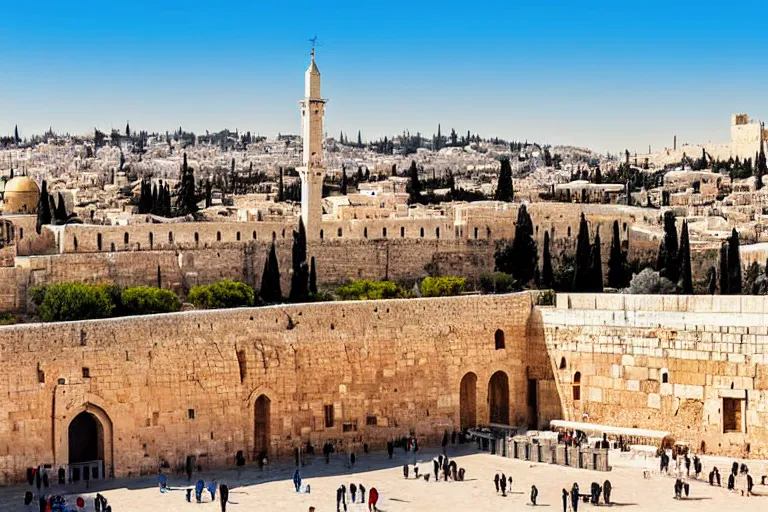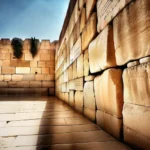Explore the historical, religious, and cultural importance of Israel for Jews worldwide.
Delve into the profound connection between Israel and Judaism, understanding its significance as a spiritual homeland, a symbol of Jewish identity, and a beacon of Jewish culture and tradition.
The Biblical Connection
The land of Israel holds a prominent place in Jewish scripture, often referred to as ‘the Promised Land.’ Why does this land hold such significance? Could it be because it is where God made an enduring covenant with Abraham and his descendants?
In the heart of Jewish tradition lies the belief that Israel was given by God to the Children of Israel as a homeland. This land, described in the Bible, symbolizes not just geographical boundaries but also spiritual and cultural identity.
Consider for a moment: if we were to think of Israel as a living testament to faith, wouldn’t its existence be seen as a divine promise fulfilled? The stories of Joshua leading the Israelites into Canaan, of King David establishing his capital in Jerusalem, and the prophets foretelling return—these narratives are woven deeply into Jewish identity.
Israel’s importance also extends beyond mere geography. It serves as a metaphor for spiritual fulfillment and connection to God. The phrase ‘returning to the land’ carries profound meaning, signifying a journey back not just geographically but spiritually—reconnecting with ancestral roots and religious heritage.
The concept of Israel as ‘the Holy Land’ transcends time and space, acting almost like a spiritual lighthouse guiding Jews worldwide. Even for those who may never set foot in the land, it remains a symbol of hope, resilience, and continuity with their past.
In essence, Israel’s significance to Judaism is multifaceted—historical, religious, and cultural. It embodies promises made by God, serves as a spiritual home, and stands as an eternal symbol of Jewish heritage. As we delve deeper into its historical journey, it becomes clear that the land of Israel continues to be central to the very essence of Jewish life.
A Historical Perspective
The journey of Israel in Judaism is like a tapestry woven through centuries, each thread representing significant events that have shaped the Jewish people’s destiny. Why does Israel hold such an indelible place in Jewish history? To answer this, we must delve into the rich historical narrative that begins thousands of years ago.
From the ancient days of Abraham, the patriarch whose covenant with God is foundational to Judaism, to the exodus from Egypt and the establishment of the First Temple under King Solomon, every step in Israel’s history carries profound meaning. The Exodus, for instance, was not just a physical liberation but a spiritual awakening, transforming the Jewish people into a nation defined by their faith and destiny.
The Exile, too, played a crucial role in shaping Jewish identity. Despite being scattered across various lands, the longing for Jerusalem and the sacred land never waned. It was during these exile periods that Judaism adapted and evolved, ensuring its survival through the ages. The return to Zion after the Babylonian Exile under Cyrus the Great symbolized not just physical resettlement but a reaffirmation of Jewish identity and aspirations.
The establishment of the State of Israel in 1948 was a monumental event that brought together historical longing with modern reality. It wasn’t merely the end of centuries of persecution, but also the beginning of a new chapter in which Jews could live freely under their own governance. This statehood became a beacon of hope and resilience, demonstrating the enduring will of the Jewish people to thrive.
Throughout its history, Israel has served as both a historical homeland and a spiritual center for Jews worldwide. It is a place where traditions are preserved, where ancient teachings come alive, and where modern challenges intersect with timeless values. The significance of Israel in Judaism lies not just in its past but in its ongoing relevance to the Jewish people’s future.
The Role of Israel in Jewish Identity
Imagine Israel as a lighthouse, guiding ships through stormy seas of diaspora and oppression. How does this land, cradle of Judaism, shape the identity of Jews scattered across continents? For many, Israel is more than just a geographical location—it’s a symbol of resilience, a beacon of hope, and a tangible link to ancient traditions.
Consider the phrase: ‘Where do I belong?’ For Jews worldwide, this question often finds its answer in Jerusalem. The city, with its ancient walls and holy sites, serves as a nexus where physical presence and spiritual connection converge. Every visit to the Western Wall, every prayer at the Kotel, reinforces the belief that ‘this is home.’ This sense of belonging, deeply rooted in history, plays a crucial role in shaping Jewish identity.
The land itself acts as a sacred tapestry, woven with threads from biblical narratives to modern struggles. Each vineyard, each olive grove, every stone wall tells a story of survival and rebirth. When Jews visit Israel, they are not just tourists; they become part of a grand narrative, participating in the ongoing saga of Jewish history.
Moreover, Israel serves as a unifying force among Jews globally. The shared experience of visiting this land, participating in its development, and contributing to its society strengthens communal ties. Whether it’s volunteering at kibbutzim or engaging in political debates, these interactions forge bonds that transcend geographical distance.
In essence, Israel is not merely a homeland; it is the cornerstone of Jewish identity. Its existence challenges us to ask: ‘What does it mean to be Jewish today?’ The answers may vary, but one thing remains clear—Israel plays an indispensable role in reaffirming our connection to tradition while embracing modernity.
Israel’s Cultural Significance
Israel, often referred to as Palestine, holds a unique and profound place in Jewish cultural heritage. It’s more than just a geographic location; it’s a canvas where generations have painted their stories, dreams, and hopes. Have you ever wondered how the landscape of Israel has influenced Jewish art, music, literature, and cuisine? The answer lies deep within its rich tapestry.
Imagine walking through the ancient streets of Jerusalem or Tel Aviv, feeling the echoes of centuries-old traditions. Every stone in these cities tells a story that has shaped Jewish culture. In Jewish art, Israel serves as an endless source of inspiration. From vibrant paintings depicting religious rituals to intricate sculptures symbolizing historical events, every piece whispers tales of resilience and faith. How do you think artists find such enduring subjects?
Moving on to music, the soundscapes of Israel blend seamlessly with Jewish musical traditions. Think about it: could there be a better place for music than this land, where songs can carry the weight of history? The melodies of Israeli folk music often evoke images of wandering shepherds or bustling marketplaces. How do you think these musical themes reflect the cultural essence of Jews worldwide?
In Literature, Israel has birthed some of the most influential and revered works in Jewish writing. Think about how literature captures the human experience, making it easier to understand and connect with others. Israeli authors like Amos Oz, Etgar Keret, and A.B. Yehoshua have penned stories that resonate globally, exploring themes of identity, conflict, and peace. How do you think these narratives contribute to shaping Jewish thought and understanding?
Lastly, no discussion about Israel’s cultural significance would be complete without mentioning its cuisine. From the aromatic spices used in traditional dishes like shakshuka to the unique flavors of hummus and falafel, every bite is a taste of history. These culinary delights reflect not just the land’s bounty but also the diverse influences that have shaped Jewish life over millennia. How do you think food connects people across generations and continents?
Israel’s cultural contributions are vast, weaving together a complex yet cohesive narrative of Jewish identity. As we explore further into the role Israel plays in modern Jewry, it becomes clear how deeply rooted these cultural elements are in our collective experience.
Modern Israel: A Homeland for Jews
When discussing the significance of Israel in Judaism, it’s impossible to overlook the profound impact of its establishment as a homeland for Jews after centuries of diaspora and persecution. How could one country encapsulate so much history, hope, and struggle into just one place? The founding of Israel in 1948 was not merely an act of political will; it was the realization of a dream that spanned generations.
The establishment of modern Israel as a homeland for Jews marked a turning point. How many Jewish hearts did this bring joy and relief, while simultaneously causing anguish to those who could not make the journey or choose to remain in their adopted homes? The state’s creation offered refuge to countless individuals seeking safety and stability after facing unspeakable horrors.
Suddenly, the concept of a “land without a people for a people without a land” became reality. The influx of Jewish immigrants, known as aliyahs, transformed Israel’s demographic and cultural landscape. These new arrivals brought with them diverse backgrounds, languages, and traditions, enriching the national tapestry. How did this diverse community come together to build a nation amidst challenges and conflicts?
The establishment of Israel also had significant implications for Jewish identity and global relations. As a sovereign state, it provided Jews worldwide with a new sense of purpose and empowerment. Could one measure the impact on communities that no longer felt compelled to assimilate or hide their heritage? For many, Israel became not just a destination but a symbol of resilience and self-determination.
The establishment of Israel as a homeland for Jews is more than historical; it’s a living testament to the enduring spirit of the Jewish people. It represents a promise kept, a commitment honored, and an opportunity seized. As we delve deeper into the future role of Israel in Judaism, let us remember this pivotal moment and its far-reaching consequences for generations to come.
The Future of Israel in Judaism
As we delve into the future role of Israel in Judaism, it’s like looking at a map where every point represents a challenge and opportunity. How can Israel continue to be the heart of Jewish life for millions around the world? The answer lies in addressing contemporary challenges head-on while embracing new opportunities.
Firstly, one cannot ignore the significant demographic shifts among Jews worldwide. With populations in Europe and North America facing decline, how can Israel strengthen its bonds with diaspora communities? This is akin to a tree needing to send its roots deeper into fertile soil; Israel must find ways to nourish and support Jewish communities globally.
Moreover, the political climate surrounding Israel often creates divides. Can Israel effectively navigate these complexities while remaining true to its commitment to Jewish values? It’s like sailing a ship through turbulent waters—steering with precision and resilience is essential.
Innovative technologies offer exciting opportunities for cultural exchange and community building. From virtual reality experiences of the holy sites in Jerusalem to online platforms that connect Jews worldwide, these tools can bridge distances and foster a sense of unity. It’s like using modern instruments to play ancient melodies—reaching new audiences with traditional music.
Lastly, Israel’s global influence extends beyond its borders. By promoting interfaith dialogue and understanding, Israel can serve as a beacon of hope and coexistence. How can it leverage this position to further the peace process? It’s like planting seeds of peace in fields where conflict has long reigned—tending them with care can yield unexpected harvests.
Conclusion
 Gain insights into the enduring bond between Jews and Israel, and appreciate the unique role it plays in shaping Jewish history, beliefs, and practices.
Gain insights into the enduring bond between Jews and Israel, and appreciate the unique role it plays in shaping Jewish history, beliefs, and practices.











